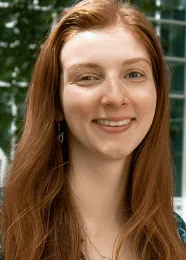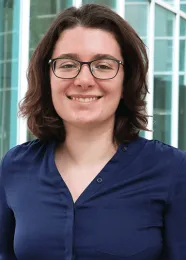
Students of UC Davis Distinguished Professor James R. Carey of the Department of Entomology and Nematology recently swept all three awards in the 2023 Norma J. Lang Prize for Undergraduate Information Research in the category of Science, Engineering and Mathematics (SEM).
Carey, praised for his innovative teaching and writing approaches, each year encourages his students to submit their term papers, work accomplished in his classes, in the Lang Prize competition. Carey students are frequent winners, but this is the first year his students swept all three awards in the SEM category. Since 2020, a Carey student has won eight of the 13 awards, including four consecutive first-place SEM awards.
The Lang Prize, launched in 2017 to encourage the use of library resources and to reward the best research papers, memorializes Norma J. Lang (1931-2015), professor emerita of botany, who taught at UC Davis from 1963 to 1991.
This year's SEM winners are Jenna Schafer, first place with a $1000 prize; Sarah Shores, second, $750; and Neha Gondra, third, $500. Maram Saada, a former student in Carey's longevity class who won the 2022 first-place SEM award, also won this year's Arts, Humanity and Social Sciences (AHSS) category.
Jenna Schafer, First Place
Schafer's winning SEM category paper, “Timeout with Torpor: History, Biology and Future Medical Applications of a Survival Strategy,” was a research project for the Entomology 199 course (Special Study): Hibernation Writing Project. Her 19-page paper included a summary, introduction, background, history, synthetic torpor induction, medical applications, discussion and literature cited.
In her summary, Schafer wrote: “As human lifespans increase, technological advances push forward to continue this trend, and human torpor has entered the discussion as a mode to improve longevity, especially by reducing patient mortality. The purpose of this paper is to synthesize literature regarding humanity's history with hibernation, to discuss potential methods to induce torpor in humans, and to determine if there may be an ethical future for this historical survival mechanism in modern medicine to increase patient longevity.”
Reflecting on the project, Schafer noted: “When I joined Dr. Carey's Hibernation Writing Project, I was assigned the topic ‘Human Torpor: Historical, Accidental, and Medical.' I started the research process under the false pretense that I could simply skip over the background-gathering phase since I already had a topic. While I have written research papers in the past, none have been quite as robust as this project, and it turned into an extremely rewarding learning experience, but I soon realized how important background information is to understand what terms to use and how to piece them together for effective searching. Suffice it to say, my search strategies evolved continuously throughout this project as I gained more skills and a deeper understanding of the search tools I am privileged to have at my disposal as a UC Davis student.”

Shores submitted her paper on “Androgen Insensitivity Syndrome: Differences of Sex Development.”
“The development of biological sex is a complex process involving the interaction of chromosomes, gonads, and hormones,” Shores wrote in her summary. “Within these processes, differences/disorders of sex development can occur, which can result in an individual's chromosomes not aligning with their external/internal genitalia and/or gonads. One of these disorders is androgen insensitivity syndrome, an XY disorder of sex development that occurs during fetal development where the androgens required to develop the male internal and external genitalia goes undetected or partially undetected, resulting in and individual having XY sex chromosomes and female, ambiguous, or male external genitalia, depending on the severity of androgen insensitivity. This condition is not always identified at birth, but individuals with this condition are expected to have a normal lifespan.”
Reflecting on the paper, Shores said she wrote it in the fall quarter of 2022 as a term paper for Carey's longevity class. “The term paper was assigned in the beginning of the quarter to provide students the opportunity to practice skills related to researching and writing scientific research papers. The topic could be of the student's choosing so as long it was related to longevity and/or health. Immediately I knew that I wanted to write about an intersex condition since as a congenital disorder, it can encompass both health and life span.” She said she consulted Carey about the “relevance of my topic…as well as the general structure.”

Neha Gondra's third-place paper, Evaluating the Influence of the Mediterranean Diet on Reducing Cardiovascular Disease Risk Factors in Obese Individuals, dealt with obesity.
“Obesity affects a significant proportion of the United States adult population,” she wrote in defining the purpose of the paper. “With the condition of obesity comes an increased risk of developing cardiovascular diseases (CVD) such as atherosclerosis and myocardial infarction, among others. Adherence to healthy diets is recommended by healthcare providers to reduce weight loss and CVD risk through the consumption of essential nutrients. The Mediterranean Diet and reduced caloric intake of the Standard American Diet (SAD) are often followed by those who are overweight or obese to reduce weight and promote health.”
Gondra reflected that she wanted “to evaluate the influence of the Mediterranean diet on reducing cardiovascular disease risk factors in obese individuals. But I had neither conducted a literature review before nor knew the guidelines for doing so. I greatly utilized a guidebook from the UC Davis Library by Helen Aveyaard titled ‘Doing a Literature Review in Health and Social Care.' I crafted a basic skeleton for my review from this book's advice. But to start with, I needed to begin reviewing primary and secondary research to create a research matrix and annotated bibliography, synthesizing information from multiple sources.”
In summarizing her work, Gondra said: “…seemed to be no significant difference between reduction of CVD risk due to the Mediterranean Diet and due to calorie restriction in SAD. Both methods seemed to reduce low-density lipoprotein cholesterol and triglyceride levels in the blood but quantitatively, the reduction of such levels was low. Adherence to the Mediterranean Diet was found to be inversely associated with CVD risk factor occurrence. Further clinical research needs to be conducted with larger sample sizes and effectively evaluating whether obese patients originally consuming SAD are better off with adhering in higher level to the Mediterranean Diet or reducing caloric intake in their existing diet.”
Arts, Humanity and Social Sciences
In the Arts, Humanity and Social Sciences category, Maram Saada won with her paper, “Beyond One-Course Competency for Addressing the Challenges of Multicultural Education and Advocacy in CSUs.” Second place went to Mikayli Moore, for her “Female Weightlifters' Presentation of Gender on Instagram.” Kiara Kunnes scored third with her paper, “Does the Nigerian Government's Response to Violent Conflict Exacerbate Civilians' Fear?”

UC Davis Distinguished Professor James R. Carey, a member of the UC Davis faculty since 1980 and an international award-winning teacher, instructs his students how to research topics, use style sheets, and structure documents.
His peers have singled him out for numerous awards, including the 2015 Distinguished Achievement in Teaching Award from the Entomological Society of America; and the 2014 Distinguished Teaching Award from the UC Davis Academic Senate, given to internationally recognized professors who excel at teaching. Carey is globally recognized for his research in insect demography, mortality dynamics, and insect invasion biology.
Carey tells his students that they need to consider their research term paper requirement, not as merely "a writing assignment," but as "a production concept" involving a number of writing concepts and components:
- Writing video series. Carey \mandates that all his students view the 13-part video playlist he produced titled “How to Write a Research Term Paper.” The playlist—viewing time totals about an hour--covers technical aspects of term paper production, including best practices in word processing and typography as well as ethical writing (no plagiarism), researching, framing, drafting, editing, proofing and finalizing (Writing Instruction Playlist).
- Model papers. Just as all researchers can view example papers in journals, students also need models, too, Carey believes. He posts a term paper example, mocked up from his own writing, as well as links to all the award-winning student papers in the Lang Prize competition and such UC Davis student publications as Prized Writing and Aggie Transcripts.
- Technical fluency. Carey requires all students to learn best practices in both typography and word processing. Students must use exact 15-point spacing (not single or double), 11-point California FB typeface (not Times Roman), 1.5-inch page margins (for shorter lines) and, using style sheet tools, must create four formatting codes that cover 98 percent of the formatting—heading level 1, subheading level 2, body text and hanging paragraph. Submitted papers are not only technically uniform, but also possess an aesthetic beauty that Carey feels either consciously or sub-consciously inspires students to take pride of ownership that carries over to their efforts in other aspects of their paper. Carey requires his students to read and follow Butterick's Practical Typography.
Storytelling. Carey stresses storytelling as the overarching, unifying concept for writing a term paper, the basics of which are that the story must have structure (a beginning, a middle and an end), a voice (the student's) and character development (main theme or thread). The process of story development is inextricably linked to their paper development; once the story begins to form in a student's head and then on paper, the narrative flows more clearly, succinctly and with much less effort than a paper containing information “dumps.” - Writing and editing. Although Carey emphasizes the importance of producing clear, succinct and technically correct prose, he tells his students that this is only a part of the larger process concerned with a paper's structure and congruency.
Here are the first-place SEM winners from the Carey classrooms since 2020:
- 2020: Jessica Macaluso “The Biological Basis for Alzheimer's Disease.”
- 2021: Barry Nguyen, “Allostasis: The Fundamental Biology and Implications for Social Standing and Longevity.”
- 2022: Maram Saada, “Huntington's Disease: Etiology, Research Models and Treatment.”
- 2023: Jenna Schafer, "Timeout with Torpor: History, Biology and Future Medical Applications of a Survival Strategy."
Resources:
- How to Apply for Lang Prize
- Lang Prize Website by Kristin Burns, digital communications manager, UC Davis Library

